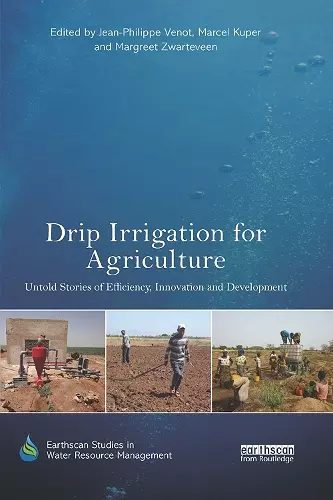Drip Irrigation for Agriculture
Untold Stories of Efficiency, Innovation and Development
Margreet Zwarteveen editor Jean-Philippe Venot editor Marcel Kuper editor
Format:Paperback
Publisher:Taylor & Francis Ltd
Published:16th Apr '19
Currently unavailable, and unfortunately no date known when it will be back
This paperback is available in another edition too:
- Hardback£155.00(9781138687073)

Initially associated with hi-tech irrigated agriculture, drip irrigation is now being used by a much wider range of farmers in emerging and developing countries. This book documents the enthusiasm, spread and use of drip irrigation systems by smallholders but also some disappointments and disillusion faced in the global South. It explores and explains under which conditions it works, for whom and with what effects. The book deals with drip irrigation 'behind the scenes', showcasing what largely remain 'untold stories'.
Most research on drip irrigation use plot-level studies to demonstrate the technology’s ability to save water or improve efficiencies and use a narrow and rather prescriptive engineering or economic language. They tend to be grounded in a firm belief in the technology and focus on the identification of ways to improve or better realize its potential. The technology also figures prominently in poverty alleviation or agricultural modernization narratives, figuring as a tool to help smallholders become more innovative, entrepreneurial and business minded. Instead of focusing on its potential, this book looks at drip irrigation-in-use, making sense of what it does from the perspectives of the farmers who use it, and of the development workers and agencies, policymakers, private companies, local craftsmen, engineers, extension agents or researchers who engage with it for a diversity of reasons and to realize a multiplicity of objectives. While anchored in a sound engineering understanding of the design and operating principles of the technology, the book extends the analysis beyond engineering and hydraulics to understand drip irrigation as a sociotechnical phenomenon that not only changes the way water is supplied to crops but also transforms agricultural farming systems and even how society is organized. The book provides field evidence from a diversity of interdisciplinary case studies in sub-Saharan Africa, the Mediterranean, Latin America, and South Asia, thus revealing some of the untold stories of drip irrigation.
‘Everything you always wanted to know about drip irrigation, but were afraid to ask. This fascinating volume uncovers untold stories that question the claims of efficiency, water saving, poverty alleviation and development. The book thus is obligatory reading not only for water engineers and agricultural scientists, but also for development workers, policy makers and social scientists.’ - Wiebe E. Bijker, Professor of Technology & Society, Maastricht University.
‘For the first time, we must confront the complexity of drip irrigation: a water-supply revolution to safeguard food security or a cheap fix that prolongs simplistic supply-side thinking? This volume is a must-read for social scientists, irrigation engineers, and policymakers alike.’ - Christopher Scott, Professor and Distinguished Scholar, University of Arizona.
‘A powerful antidote to the technocratic literature on drip irrigation, the analysis masterfully weaves together sociological, political, and philosophical threads. An important and original contribution to our understanding of the collective narratives at play as we enact complex changes to water governance in search of greater sustainability.’ - Karen Bakker, Professor and Canada Research Chair, University of British Columbia.
‘We all have much to learn before smallholders in the global South adopt drip irrigation at scale. That is where this book comes in and why it is so important.’ - from the Foreword, by Andy Keller,Keller-Bliesner Engineering and Utah State University, USA
‘It is high time that more clarity be brought to the debate about drip irrigation, its specificities, and the role it can play in agricultural development strategies, and that is exactly what this book helps doing.’ - from the Foreword, by Jean-Marc Faurès, UN Food and Agriculture Organization
‘This book makes a significant contribution to not only irrigation studies, but to interdisciplinary development studies more generally.’ - from the Foreword, by Peter Mollinga, SOAS, University of London, UK
ISBN: 9780367245023
Dimensions: unknown
Weight: 453g
358 pages